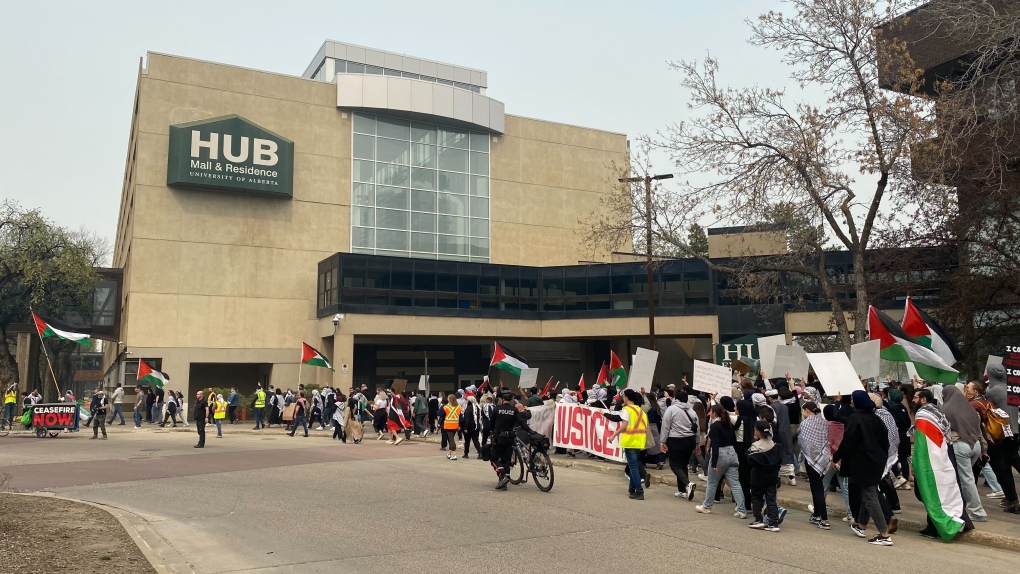
Several hours after after police forcefully removed a camp of pro-Palestinian demonstrators from the University of Alberta, hundreds of protesters marched from downtown toward the campus.
The camp began forming on the north campus at the university on Thursday, with students and demonstrators joining a global movement condemning the war in Gaza and demanding the school divest from Israel.
In an early morning press release, police said the camp was dismantled after “repeated notice to encampment participants by the university that their activities violate university policy.”
Officers said final notice was given to protesters by the U of A at 4:35 a.m. Saturday.
“EPS officers arrived on site and protestors were warned again to leave, and following this, protestors were escorted from university property,” police said.
Three people were arrested. Charges laid include assaulting a peace officer, trespassing and obstruction.
Police said none of the three people arrested were students at the university and no one was hurt.
However, pictures and video of the clearing posted to social media shows police striking several demonstrators with batons.
A large pro-Palestinan protest was scheduled at Violet King Henry Plaza at noon Saturday, and what appeared to be hundreds of demonstrators marched toward the University of Alberta.
‘Community safety at risk’
The encampments followed a pattern of protests that have been unfolding at university campuses across North America in recent weeks, from Columbia University in New York to UCLA in Los Angeles.
Guidelines posted at the camp and on Instagram asked anyone joining the protest to keep its purpose front of mind, wear masks, and to not engage in any discriminatory behaviour. Participants were also asked to avoid engaging with counter protesters, security and police.
However, in a statement from University of Alberta, president and vice-chancellor Bill Flanagan said Saturday that the university had seen how quickly situations at other protests had escalated.
Procedures for demonstrations and protests on university campuses do not allow temporary structures – like tents or barricades – nor the camping of demonstrators overnight.
The university said it has been clear that “violation of the law or policies of the university goes beyond the parameters of freedom of expression.”
The Alberta NDP justice critic Irfan Sabir issued a joint statement Saturday with NDP advanced education critic Rhiannon Hoyle, criticizing the decision to have police remove demonstrators.
“The police response to peaceful student demonstrations at the University of Alberta appears completely disproportionate to student actions,” the statement read. “It is unacceptable that student protest is treated as a public safety issue, especially in the wake of a similarly excessive response at the University of Calgary.”
According to Flanagan, police were called to assist after “communications with the group were not successful and escalating actions put the university community’s safety at risk.”
Most of the protesters, he said, left “peacefully” after the final trespassing notice was given.
“At the time the encampment cleared, there were approximately 40 tents and 50 people. To the best of our knowledge, fewer than 25 per cent of the occupants were University of Alberta students,” Flanagan said.
“I want to be clear that approved, peaceful protests are welcome on our university campuses — but they must also proceed in accordance with the university’s policies,” he said later in his statement.
The university said Saturday afternoon that no students associated with the camp had been suspended or banned from the campus.
On Friday, Premier Danielle Smith said the decision to have police remove pro-Palestinian protesters from the University of Calgary was justified, and the province was ready to assist the University of Alberta if needed.
“Because of the Coutts blockade, we have laws in the province, and you cannot block critical infrastructure, and in this case, it’s private property,” Smith said.
With files from CTV News Calgary’s Stephen Hunt and CTV News Edmonton’s Alex Antoneshyn
This is a developing story. More details will be added as they become available …